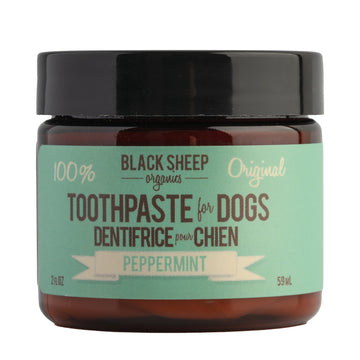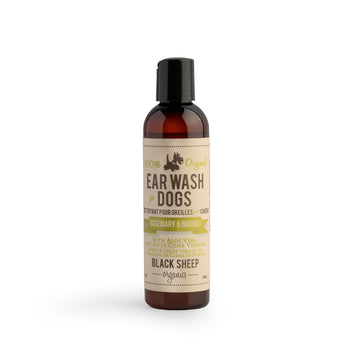Does your dog leave a bit of an unpleasant odor behind? Pet deodorizers seem like a quick and easy solution, but are they safe for our canine companions? This post will explore the safety of pet deodorizers, investigating common ingredients and their potential effects on dogs. So that you can make an informed decision about whether or not to use them on your furry friend.
How Do Pet Deodorizers Work?
To make informed choices, it's important to understand exactly how these products work and the science behind them.
Types of Pet Deodorizers
Pet deodorizers come in several forms, each designed for different applications:
- Sprays: Applied directly to the dog's coat for quick results.
- Wipes: Handy for on-the-go use and spot cleaning.
- Shampoos: Used during baths for a more thorough cleanse.
- Powders: Sprinkled onto the coat and brushed through.
The Science Behind Pet Deodorizers
At their core, pet deodorizers work through two primary mechanisms: neutralizing odors or masking scents. Let's break down how each method works.
Odor Neutralization
Odor neutralizers contain enzymes or other chemicals that target and break down the molecules responsible for bad smells. Here's how it works:
- Enzymatic Action: Enzymes in the deodorizer break down organic matter such as urine or sweat, neutralizing the odor at its source.
- Chemical Agents: Some deodorizers use chemical agents that react with odor molecules, rendering them odorless.
- Masking Scents: Masking agents work differently. Instead of neutralizing the odor, they cover it with a more pleasant fragrance. While this provides immediate relief from unpleasant smells, it's a temporary solution that doesn't address the underlying cause.
Are Pet Deodorizers Safe for Dogs?
The safety of pet deodorizers for our furry friends is also a crucial concern. Let's see the potential risks and benefits of pet deodorizers and offer tips on choosing safe options for your dog.
Evaluation of Safety Standards and Regulations
While many pet deodorizers are marketed as safe, it's important to scrutinize their ingredients and compliance with safety standards. Regulatory bodies like the Environmental Protection Agency (EPA) and organizations such as the American Society for the Prevention of Cruelty to Animals (ASPCA) provide guidelines and issue warnings about certain chemicals. If you are still not sure which chemicals shall be safe for your dog, try use products made from organic ingredients.
For instance, some deodorizers may contain substances that could be harmful to pets. It's always wise to check specific ingredients against trusted resources.
Potential Risks and Benefits of Using Pet Deodorizers
There are indeed potential risks and benefits to using pet deodorizers, just like with any other household cleaning product. Some of them include:
Risks:
- Toxic Ingredients: Certain chemicals, such as phenols and alcohol can be toxic to dogs and other pets. Products containing pine and citrus should be used cautiously.
- Skin Irritations: Some deodorizers may cause allergic reactions or irritations, especially in pets with sensitive skin.
- Respiratory Issues: Strong fragrances can lead to respiratory problems in dogs, particularly in those with pre-existing conditions like asthma.
Benefits:
- Odor Control: Effective deodorizers can help maintain a pleasant environment by neutralizing unpleasant pet odors.
- Hygiene Maintenance: Some deodorizers come with antibacterial properties, contributing to overall cleanliness and reducing the risk of infections.
- Behavioral Management: Certain deodorizers can contain calming scents, such as lavender or chamomile, which can help soothe pets and reduce anxious behaviors.
Tips for Choosing Safe Deodorizers for Dogs
Here are some tips to keep in mind when selecting a pet deodorizer:
- Read Labels Thoroughly: Avoid products with vague ingredient lists. Look for non-toxic, hypoallergenic formulations specifically designed for pets.
- Consult Reliable Sources: Use databases from reputable animal health organizations or consult your veterinarian for recommendations.
- Choose Natural Options: Opt for deodorizers made from natural ingredients without harsh chemicals or artificial fragrances. Products with plant-based ingredients, like natural dog shampoo, can be safer alternatives.
- Test Before Regular Use: Apply a small amount of the product on your pet's skin to check for any adverse reactions before broader application.
- Use Sparingly: Even safe deodorizers should be used in moderation. Frequent use can sometimes lead to buildup on your pet’s coat or skin.
- Ventilation: Ensure proper ventilation when using these products indoors to minimize the concentration of any potentially harmful substances.
Does Dog Deodorizing Spray Work?
When it comes to maintaining your dog's hygiene, deodorizing sprays are a popular option. But how effective are they really? Let's take a closer look at this section.
Effectiveness of Dog Deodorizing Sprays
Dog deodorizing sprays aim to neutralize odors rather than just masking them. These sprays often contain ingredients that break down odor-causing molecules. There are several factors influence the effectiveness of these sprays:
- Quality of Ingredients: Higher-quality sprays tend to use natural and safe ingredients like essential oils, which not only help neutralize odors but also provide a pleasant scent.
- Frequency of Use: Regular application can lead to more consistent results. However, overuse may cause skin irritation for some dogs.
- Application Method: Ensuring the spray reaches the skin (where most odors originate) rather than just the fur improves effectiveness.
Real User Experiences
Many dog owners report positive experiences with deodorizing sprays, particularly when used as part of a broader grooming routine. For instance:
- Ease of Use: Sprays are quick and convenient, making them ideal for on-the-go freshening up.
- Immediate Results: Users often notice an immediate improvement in their dog's smell.
- Skin and Coat Benefits: Some sprays include conditioning agents that benefit the dog's coat, making it softer and shinier.
Comparing Deodorizing Sprays with Other Pet Deodorizers
Deodorizing sprays are just one of many options available. Here's how they stack up against other common pet deodorizers:
|
Product Type |
Pros |
Cons |
|
Deodorizing Sprays |
Quick application, portable, immediate results |
May require frequent reapplication, potential for skin irritation |
|
Wipes |
Convenient for spot cleaning, can clean dirt and debris |
Limited area coverage, waste generation |
|
Shampoos |
Thorough cleaning, long-lasting effects, beneficial for skin |
Time-consuming, requires water, not suitable for daily use |
|
Powders |
Absorbent, can reduce moisture, useful for skin folds |
Can be messy, potential for inhalation issues, may need brushing out |
Which One Should You Choose?
Choosing the right deodorizer depends on your needs and lifestyle:
- For Quick Freshening Up: Deodorizing sprays or wipes are excellent for instant results and convenience.
- For Deep Cleaning: Shampoos provide a thorough clean and may be more effective for long-term odor control.
- For Moisture Control: Powders are particularly useful for areas prone to moisture and can help keep skin folds dry.
Pet deodorizers, when used correctly, can be safe and effective for managing dog odors. It’s crucial to choose high-quality products with safe, natural ingredients and to follow application guidelines to avoid skin irritation. Whether you prefer sprays, wipes, shampoos, or powders, each has its benefits and considerations. Always monitor your dog's reaction and consult with a vet if any concerns arise, ensuring your pet stays fresh and healthy.











